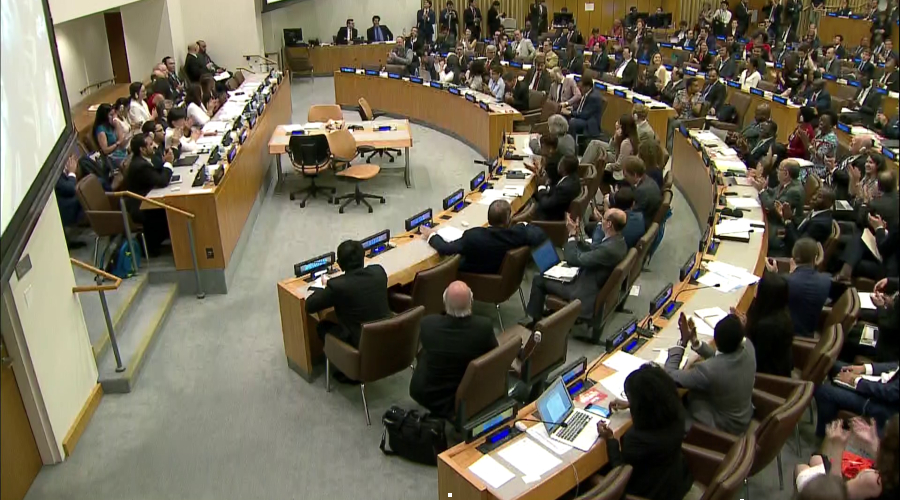How to Support the Treaty on the Prohibition of Nuclear Weapons Without Signing It
The Biden administration has already promised to act on one of the treaty's key provisions.

Editor’s Note: The Treaty on the Prohibition of Nuclear Weapons (TPNW), which outlaws nuclear weapons, entered force just after Biden’s inauguration. Although the Biden administration is highly unlikely to adhere to it directly, can it take smaller steps in line with the TPNW’s goals? Boston University’s Jayita Sarkar outlines a series of measures the administration could take, such as providing assistance to victims of radiation, that would advance the TPNW’s agenda but do not require complete adherence.
Daniel Byman
***
The Treaty on the Prohibition of Nuclear Weapons (TPNW) entered into force on Jan. 22, 2021, only two days after a new U.S. administration was sworn in. The treaty is the first multilateral legal document to outlaw nuclear weapons. How will the Biden administration respond now that it is international law? In recent weeks, former policymakers, including former Secretary of Defense William Perry and former Undersecretary of State for International Security and Nonproliferation Thomas Countryman, have called for the Biden administration to adopt a supportive position on the TPNW. Critics of the treaty, such as then-U.S. Ambassador to the United Nations Nikki Haley, have called for proactive opposition, or at least benign neglect. But perhaps there is a third option that the administration could consider: the middle ground of selective support.
President Obama’s famous Prague Speech in 2009 called for a world without nuclear weapons, but his administration opposed the multilateral efforts at the U.N. General Assembly that led to the TPNW. U.S. policymakers argued that a nuclear weapons ban was contrary to U.S. national interests and those of countries that possessed or stationed nuclear weapons. They worried that the nuclear weapons ban could weaken the 1968 Treaty on the Non-Proliferation of Nuclear Weapons (NPT), considered to be the cornerstone of the nuclear multilateral regime.
The Trump administration boycotted the U.N. General Assembly negotiations in 2017, along with the United Kingdom, France, South Korea, and other U.S. allies and friends. When the 50th country ratified the TPNW in October 2020, paving the way for the treaty to become international law, the U.S. government urged countries that had already ratified the TPNW to withdraw support. All nine countries that possess nuclear weapons oppose the TPNW, as do those that host nuclear weapons because of security guarantees they enjoy from major powers, such as U.S. NATO allies.
When the world is viewed solely through the prism of nuclear deterrence, the TPNW seems unrealistic and its supporters appear as impractical idealists. The TPNW, though, was developed from the approach that foregrounds the “humanitarian consequences” of nuclear weapons. This approach encompasses much more than the notion of a fragile balance of power maintained by nuclear weapons. Much of the treaty is about the effects of nuclear weapons and nuclear explosive devices on the human body. The Biden administration can show its selective support on this issue, breaking with the policy of the past two U.S. administrations.
The United States is responsible for the atomic bombings of Hiroshima and Nagasaki in August 1945 and for 1,032 nuclear weapons tests that took place between 1945 and 1992. The majority of the tests were conducted in New Mexico, Nevada, Alaska, and the Pacific Ocean. Article 6 of the TPNW, entitled “Victim assistance and environmental remediation,” calls on state parties to “adequately provide age- and gender-sensitive assistance, without discrimination, including medical care, rehabilitation and psychological support, as well as provide []social and economic inclusion” to those affected by nuclear weapons and nuclear explosive devices.
Providing assistance to victims of radiation in the United States has been a slow, arduous and incomplete process. The Radiation Exposure Compensation Act (RECA) was passed only in October 1990 and expanded in 2000. Administered by the U.S. Department of Justice, RECA provides one-time benefits payments to those who have developed cancers and specified diseases as a consequence of radiation exposure caused by nuclear weapons testing and uranium mining, milling or transporting. RECA has provided $2.4 billion in benefits to more than 37,000 claimants since 1990 but is expected to sunset in July 2022.
RECA itself has several limitations. First, it has a narrow definition of “downwinders”—the individuals living downwind of the Nevada Test Site who are eligible for compensation. Downwinder-eligibility requires individuals to have a diagnosis of a compensable disease caused by radiation exposure and proof of residence in selected counties of Arizona, Nevada, and Utah during the period of atmospheric testing at the Nevada Test Site. Second, RECA denies compensation to victims of uranium mining after 1971, when the U.S. Atomic Energy Commission’s mining activities were transferred to commercial firms.
The 2020 Democratic Party platform explicitly called for increasing victim assistance under RECA. More broadly, the platform also pledged the party to “pursuing environmental justice and climate justice, including for Indigenous peoples and communities.” Given that the majority of downwinders and uranium miners are from Indigenous communities in the United States, the Democratic Party’s commitment to “protecting Native American health” is compatible with the humanitarian consequences approach to nuclear weapons. Moreover, for the first time in its history, the Department of the Interior, the federal agency responsible for appropriation of Indigenous lands since the 19th century westward expansion, will have a Native American head—Rep. Deb Haaland, an enrolled citizen of the Pueblo of Laguna. Haaland and her fellow Democrats from New Mexico have been proactive in pushing for legislation to expand radiation compensation.
In other words, the Biden administration has already promised to act on the humanitarian consequences of nuclear testing in the United States. If the administration delivers on its promise, it would be addressing commitments covered in Article 6 of the TPNW, even without signing the treaty.
The TPNW is a multilateral treaty, which requires policy harmonization through domestic legislation to be implemented. RECA offers preexisting legal infrastructure on which the Biden administration can build and, with its inclusion of uranium mining, even corrects a major weakness of the TPNW, which focuses solely on victims of nuclear weapons and nuclear explosive devices.
To be sure, promoting an expanded RECA as evidence of U.S. selective support for the TPNW would require diplomatic finesse at the United Nations. But, if backed by political will, the State Department under Secretary of State Antony Blinken, Deputy Secretary of State-designee Wendy Sherman, and Undersecretary-designee for Arms Control and International Security Affairs Bonnie Jenkins will have the wherewithal for it.
Selective U.S. support to the TPNW would be an unusual approach toward a new treaty, but it would not be unprecedented. In 1968, when the NPT was first opened for signature, France refused to sign it. The Charles de Gaulle government had already been boycotting for several years the negotiations at the Eighteen Nations Disarmament Committee in Geneva, Switzerland, that led to the NPT. The French representative, Armand Bérard, however, declared that even though France was not going to accede to the NPT, it would responsibly act as if it were a signatory. U.S. policymakers were disdainful of the French approach to the NPT during the Cold War, especially after France’s withdrawal from NATO’s integrated command structure two years before. Nevertheless, the measure did not completely preclude France’s future accession to the NPT, which eventually took place in 1992.
By selectively supporting the TPNW through Article 6 commitments while not acceding to it, the Biden administration can be at the forefront of an anti-racist global nuclear agenda. It can promote the U.S. image abroad, which has been tarnished by the Trump administration’s four years of isolationist “America First” rhetoric. It could also win support at home. According to a 2020 poll by the Chicago Council on Global Affairs, 66 percent of Americans want a world without nuclear weapons.
The present moment offers the promise of unprecedented change in global nuclear politics. When the 10th NPT Review Conference takes place in New York in August 2021 (postponed from 2020), it will be the first time in the history of the nuclear age that there will be another nuclear treaty demanding attention and action. The Biden administration could seize the day and make history.





